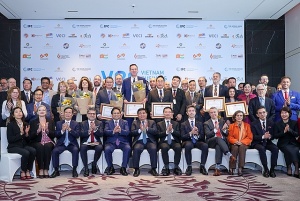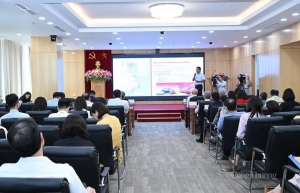Groundwork laid for the dual transition
Danish-backed jewellery maker Pandora last week broke ground on a $150 million factory at VSIP III Industrial Park in the southern province of Binh Duong. Scheduled to begin operations in early 2026, the factory will produce 60 million pieces of jewellery annually, boosting the group’s production capacity by 50 per cent.
The factory will be powered entirely by renewable energy and built to LEED Gold standards, supporting Pandora’s goal to halve carbon emissions across its supply chain by 2030 and achieve net-zero emissions by 2040. The facility will create approximately 7,000 jobs, with recruitment starting in early 2025.
“We are ready to start a new chapter in Vietnam. The new facility is crucial to meet future demand and support our growth,” said Alexander Lacik, CEO and president of Pandora. He highlighted Vietnam’s long-standing craft tradition and Binh Duong’s robust industrial infrastructure and governmental support as key factors in their decision to develop here.
Adjacent to Pandora’s factory, Danish conglomerate Lego is also constructing its first carbon-neutral facility worldwide, with a total investment of $1.3 billion.
Vo Van Minh, Chairman of Binh Duong People’s Committee, stated, “The presence of both Lego and Pandora at VSIP III is a testament to the province’s successful economic transformation, making it an attractive destination for international investors.”
Jacob Jensen, Denmark’s Minister of Food, Agriculture, and Fisheries, also highlighted, “Vietnam has become an increasingly important market for Danish investors, thanks to its favourable business environment and commitment to achieving net-zero emissions by 2050.”
 |
| Groundwork laid for the dual transition, Photo: Le Toan |
There are more major investment moves taking place in Vietnam. Last week, domestic tech giant VNG partnered with Nvidia to enhance its cloud computing capabilities, aligning with the US chipmaker’s strategy to expand its presence across Asia. This partnership was announced shortly after Nvidia CEO Jensen Huang’s visit to Asia, aimed at strengthening regional ties.
Haiphong People’s Committee and Ecovance Vietnam, a subsidiary of South Korea’s SK Group, last week broke ground on a high-tech biodegradable materials factory in Hai An district.
Park Won Cheol, CEO of SKC Group, stated, “This modern factory is designed for the global biodegradable materials market. It is rare for advanced technology developed by SKC to be applied in a factory outside South Korea.”
The venture, undertaken by Ecovance Vietnam, aims to produce biodegradable plastics and related materials. It marks SK Group’s first venture in Vietnam, highlighting their expertise in secondary batteries, semiconductor materials, and eco-friendly products.
On a locality level, Ho Chi Minh City is also making strides to attract high-quality foreign direct investment (FDI). Tran Phu Lu, director of Ho Chi Minh City Investment and Trade Promotion Centre, last week revealed at an investment promotion event that the new legal framework for Resolution No.98/2023/QH15 will leverage the city’s potential and create breakthroughs to resolve economic and social bottlenecks.
“The resolution includes pilot projects for transit-oriented development, build-operate-transfer contracts for expanding existing road projects, and expanding public-private partnerships in healthcare, cultural sports, and attracting strategic investors to key projects,” he said.
Currently, Ho Chi Minh City is prioritising digital and green transition, aiming for sustainable development with a focus on high technology, supporting industries, microelectronics, semiconductors, finance and banking, IT, and logistics. This approach is expected to pave the way for high-quality FDI attraction, similar to the successful investments seen in Binh Duong, Haiphong, and Bac Ninh province.
According to Prof. To Trung Thanh of the National Economics University, although the domestic private sector is large in number, with 97 per cent of enterprises being small or medium in size and primarily operating in commerce, services, wholesale, and retail, they are not strong enough to be the main economic pillar.
“In contrast, foreign-invested enterprises (FIEs), mostly large ones, focus on processing and manufacturing, accounting for over 70 per cent of total import-export turnover. This makes FDI one of the most important pillars of economic growth for Vietnam,” Thanh said.
On the other hand, he also acknowledged that Vietnam has not fully assessed whether additional incentives are needed to attract investment, including corporate income tax incentives and non-tax measures.
“The global minimum tax (GMT) is to impact over 120 FIEs in Vietnam currently enjoying tax exemptions and reductions with effective rates below 15 per cent,” he said. “ASEAN countries are urgently adapting to the GMT, and Singapore and Thailand have introduced policies to attract FDI. Vietnam should study these experiences, as tax incentives are no longer our competitive edge.”
Meanwhile, at last week’s event held by Vietnam Investment Review on Vietnam’s green-digital dual transition, speakers emphasised that foreign investors prioritise profitability, stability, predictability, clarity, and transparency in policies and regulatory frameworks. Ensuring these attributes is crucial for building trust and confidence among investors, they said (see quotes, and pages 5-7).
In addition, human resource upskilling and a stable legal framework are among the most critical factors for attracting and retaining foreign investment.
| Do Van Su, deputy director general, Foreign Investment Agency, Ministry of Planning and Investment
Vietnam is entering an era which focuses on both green growth and digital transformation, which is key to its sustainable economic growth and long-term goals. In this, government policy and legal framework to promote foreign direct investment for dual transformation in the business community, especially foreign-invested enterprises, play a key role. From a policy standpoint, and crucially for the legal framework governing businesses and investors in Vietnam, there are three key legal documents directly promote green transformation. The first document is the National Green Growth Strategy, which outlines a path for sustainable economic growth by focusing on reducing greenhouse gas emissions, improving energy efficiency, and fostering green industries. It serves as a comprehensive blueprint for transitioning to a low-carbon economy and enhancing environmental sustainability. Secondly, Vietnam’s strategy on climate change response is a comprehensive plan that emphasises measures to protect coastal areas, manage natural resources, and develop renewable energy sources. Given that Vietnam has numerous coastal areas significantly affected by climate change, this strategy addresses critical issues such as coastal erosion, sea-level rise, and the sustainable use of marine resources. The third crucial legal framework is the adoption of the new Law on Environmental Protection. This law strengthens regulations on environmental impact assessments, pollution control, and biodiversity compensation. It aims to enhance the legal mechanisms for environmental protection, ensuring that economic development does not come at the expense of environmental degradation. However, there are challenges that investors face when operating in Vietnam, particularly concerning the stability of the electric power supply. Last year, several investors expressed concerns to the Ministry of Planning and Investment about the inconsistent power supply affecting their manufacturing operations. Recognising these difficulties, comprehensive efforts are being made to address them. The minister of planning and investment has instructed Vietnam Electricity and related companies to ensure a stable power supply for foreign companies, especially during the peak summer months. To prepare for the influx of foreign investment in green and digital transformation, comprehensive strategies will focus on high-tech projects, renewable energy, smart manufacturing, green infrastructure, and digital transformation. The second key step is to strengthen its regulatory framework, particularly admin procedures. Lastly, Vietnam must focus on developing infrastructure and training skilled labour to support advanced sectors. However, the challenge is to implement policies effectively and ensure that the legal framework is efficient. Rizwan Khan, managing partner, Acclime Vietnam
Vietnam has done well in terms of digital transformation. Looking at the global innovation index, Vietnam was 46 out of 132 countries by the end of 2023, which shows that Vietnam has done wonders in the last four or five years. When we talk about technology like blockchain and AI, all these things need to be leveraged by businesses. However, in order to leverage them, there has to be a proper framework because these technologies may raise the issue of data privacy and cybersecurity. When we look at data privacy and cybersecurity, generally people look at these in isolation. However, they go hand-in-hand because one may affect the other. Vietnam has done a fantastic job in enacting regulations regarding data privacy. That ensures that all data collected within Vietnam’s geographical boundaries is stored in Vietnam, or if it is going outside geographical boundaries, it must be reported to the relevant ministries. Businesses need to comply with those requirements. When we look at the commercial aspect or the reality of data privacy, a couple of years ago it was not a massive topic in Vietnam. Cybersecurity is also something that is taken for granted. But Vietnam has done many good things and has taken many good steps. Those are going all in the right direction and making sure that people who are interacting with businesses, whether they are customers, employees, or vendors, have their data secured, and that any breach of data is actually reported to authorities as well as to the data subject. |
 | PM urges FIEs lead the way on green transformation Seeing foreign-invested enterprises (FIEs) as an important driving force behind innovation, Prime Minister Pham Minh Chinh has called on them to help Vietnam implement its green transformation and sustainable development strategies. |
 | Vietnam to have many opportunities from digitalisation, green transformation: IMF The International Monetary Fund (IMF) has forecasted that Vietnam will have many opportunities from digitalisation and green transformation, according to IMF Asia and Pacific Department Director Krishna Srinivasan. |
 | Low-code: a powerful enabler for the digital transformation The low-code development platform is emerging as a powerful enabler for digital transformation. Nguyen Ngoc Hoang, director and digital innovation lead at KPMG in Vietnam, explains how it empowers business users to quickly create and adapt applications without the need for specialised programming knowledge and experience. |
 | Experts urge promotion of digital transformation in logistics, e-commerce Applying technology in logistics and e-commerce will bring many benefits, thus optimising the efficiency of these two sectors, and contributing to reducing logistics costs for the entire economy, heard a workshop in Hanoi on May 16. |
What the stars mean:
★ Poor ★ ★ Promising ★★★ Good ★★★★ Very good ★★★★★ Exceptional
Related Contents
Latest News
More News
- Site clearance work launched for Dung Quat refinery upgrade (February 04, 2026 | 18:06)
- Masan High-Tech Materials reports profit: a view from Nui Phao mine (February 04, 2026 | 16:13)
- Hermes joins Long Thanh cargo terminal development (February 04, 2026 | 15:59)
- SCG enhances production and distribution in Vietnam (February 04, 2026 | 08:00)
- UNIVACCO strengthens Asia expansion with Vietnam facility (February 03, 2026 | 08:00)
- Cai Mep Ha Port project wins approval with $1.95bn investment (February 02, 2026 | 16:17)
- Repositioning Vietnam in Asia’s manufacturing race (February 02, 2026 | 16:00)
- Manufacturing growth remains solid in early 2026 (February 02, 2026 | 15:28)
- Navigating venture capital trends across the continent (February 02, 2026 | 14:00)
- Motivations to achieve high growth (February 02, 2026 | 11:00)



 Tag:
Tag:



















 Mobile Version
Mobile Version